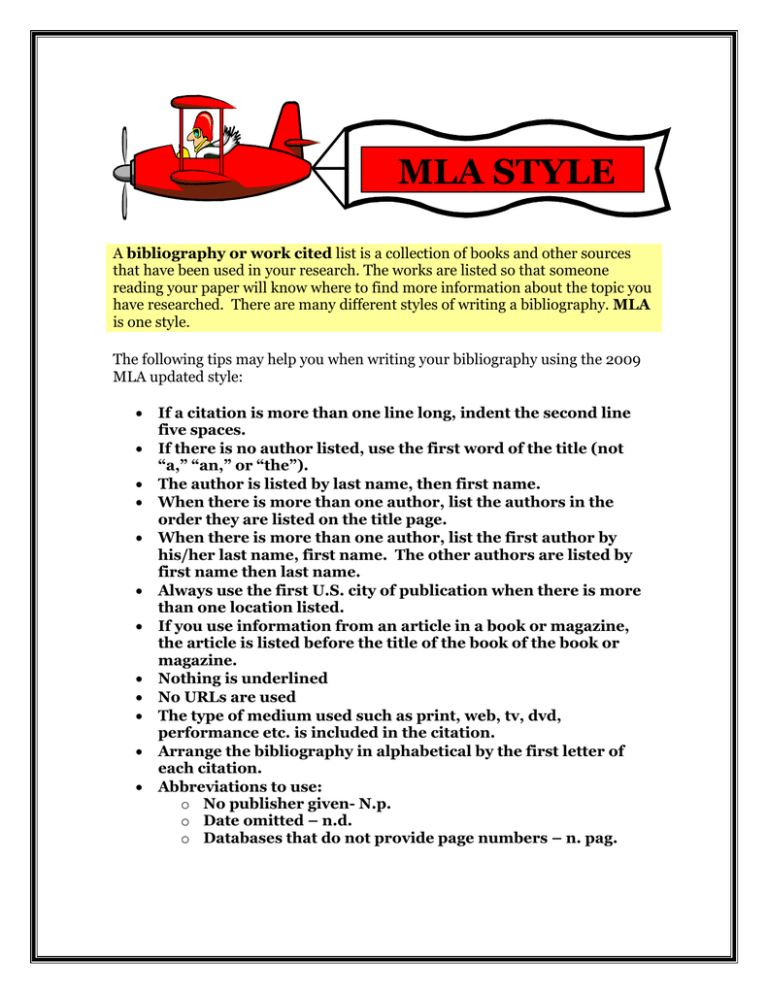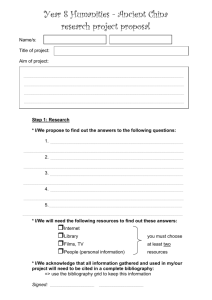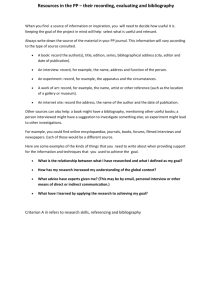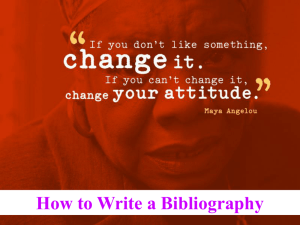MLA STYLE
advertisement

MLA STYLE A bibliography or work cited list is a collection of books and other sources that have been used in your research. The works are listed so that someone reading your paper will know where to find more information about the topic you have researched. There are many different styles of writing a bibliography. MLA is one style. The following tips may help you when writing your bibliography using the 2009 MLA updated style: If a citation is more than one line long, indent the second line five spaces. If there is no author listed, use the first word of the title (not “a,” “an,” or “the”). The author is listed by last name, then first name. When there is more than one author, list the authors in the order they are listed on the title page. When there is more than one author, list the first author by his/her last name, first name. The other authors are listed by first name then last name. Always use the first U.S. city of publication when there is more than one location listed. If you use information from an article in a book or magazine, the article is listed before the title of the book of the book or magazine. Nothing is underlined No URLs are used The type of medium used such as print, web, tv, dvd, performance etc. is included in the citation. Arrange the bibliography in alphabetical by the first letter of each citation. Abbreviations to use: o No publisher given- N.p. o Date omitted – n.d. o Databases that do not provide page numbers – n. pag. Book Citations: Where to Find the Information: ALWAYS USE THE TITLE PAGE FOR THE INFORMATION YOU USE IN YOUR BIBLIOGRAPHY! The information not found on the title page is usually found on the verso (reverse of the title page). Bibliographic citations vary depending on many factors. Below you will find examples of various book citations. Book with one author: (author last, first. Title in italics. City of publication: Publisher, Date of publication. Print.) Lavender, David. Snowbound: The Tragic Story of the Donner Party. New York: Holiday House, 1996. Print. Book with two authors: Example: Lurie, Jon and Jimmy Clarke. Fundamental Snowboarding. New York: Lerner, 1996. Print. A book that has an editor: If the city of publication is unfamiliar, the name of the state or country is listed as well. Example: Ehrlich, Amy, ed. When I was Your Age: Original Stories About Growing Up. Cambridge, Mass.: Candlewick Press, 1996. Print. Encyclopedia and Other Reference Books: An encyclopedia article may or may not have an author. The author’s name can often be found at the end of the article. An article with a is referred as a “signed article.” No volume number or page numbers are needed in the citation. Signed articles: The name of the encyclopedia article is placed after the author’s name and put in quotation marks. Example: Sutherland, Zena. “Literature for Children.” World Book Encyclopedia. Chicago: World Book, 2008. Print. Unsigned articles: Exactly the same without an author’s name. “Literature for Children.” World Book Encyclopedia. Chicago: World Book, 1997. Print. Dictionary entry: When a dictionary is well known, list the author (if one is known) with the last name first. The word you used is listed next in quotes, followed by the title of the book, the edition number (if any), the date of the edition, and print. You only use a dictionary entry for special word usage not for every work you look up. “Antidisestablishmentarianism.” The American Heritage Dictionary Of English Language. 6th ed. 2006. Print. Internet Website with an Author: Author (if known). “Title of Page or Document.” Title of Site or Larger Work. Date of document (if listed). Web. Last date you were visited the site. Example: Lubell, Sam. Of the Sea and Air and Sky. New York Times, 26 Nov. 2008. Web. 1 Dec. 2008. Website without Author: Begin with the title of the page used. Use n.d. when site does not have an update/created date. Example: “Graf Has Look of a Champion.” ESPNET SportsZone. n.d. Web. 2 April 2005. Article from Magazine on an Online Database (ex. EBSCO): Author. “Article Title.” Periodical Title. Date of print publication (if available). Edition (if any): pages. Database Name. Web. Last date you used the site. Example: Johnson, Kirk. “The Mountain Lions of Michigan.” Endangered Species. 19.2 (2002): 27-31. GrolierOnLine. Web. 26 Nov. 2005 (SHORT SAMPLE OF A BIBLIOGRAPHY/WORK CITED) Bibliography “Citations for Electronic Sources”. American Library Association. 1998.Print Giddens, Gary. “How to Write a Bibliography Complex Version.” Oakley Middle School Homepage.2006-7.Web. 12 Mar 2007 Sutherland, Zena. “Literature for Children.” World Book Encyclopedia. Volume 12. Chicago: World Book, 1997.Print Glossary: biography ------bibliography --citation ---------et al. ---- --------periodical ------- A book written about a person’s life. A list of materials used in creating a report or paper. Source of information used in a report. “and others” Publication, especially magazine or newspaper that is printed in regular intervals. publisher -------- The company that produces the material. signed ------------ An article that has an author listed. verso ------------- Opposite of the title page (the left page of a book) work cited ------ A list of materials used in creating a report or paper.


